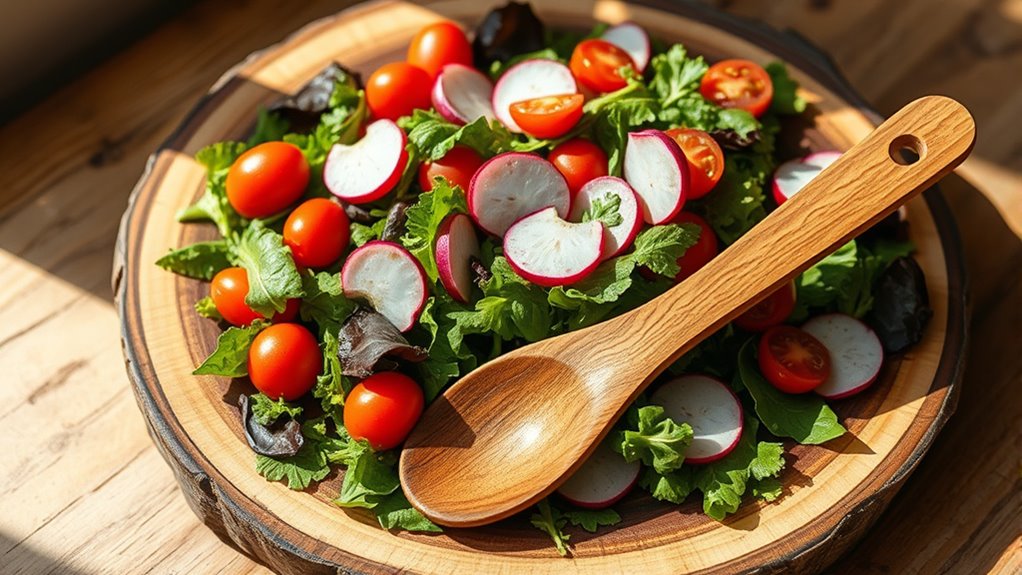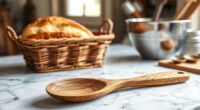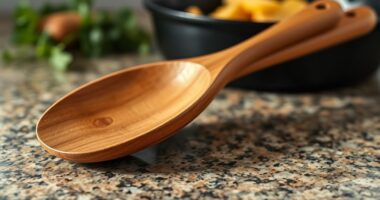Choosing wooden salad servers supports healthy eating and sustainability. Made from renewable, biodegradable woods like cherry, maple, or black walnut, they’re eco-friendly alternatives to plastic, reducing waste and carbon footprints. Their ergonomic design makes tossing and serving salads easier and mess-free. Properly cared for, these durable utensils last longer and promote safer food contact. Keep exploring to discover how to select and maintain the perfect set for your kitchen.
Key Takeaways
- Wooden salad servers are made from renewable, biodegradable woods, promoting eco-friendly and sustainable healthy eating practices.
- Their natural, chemical-free surfaces reduce bacterial growth, ensuring safer food contact and healthier salads.
- Ergonomic, precise designs make tossing and serving salads easier, encouraging more homemade healthy meals.
- Proper maintenance of wooden utensils prolongs their lifespan, supporting environmentally conscious reuse and waste reduction.
- Using handcrafted, non-toxic wooden servers aligns with eco-conscious choices for a healthier lifestyle.
The Eco-Friendly Choice: Wooden Utensils and Sustainability
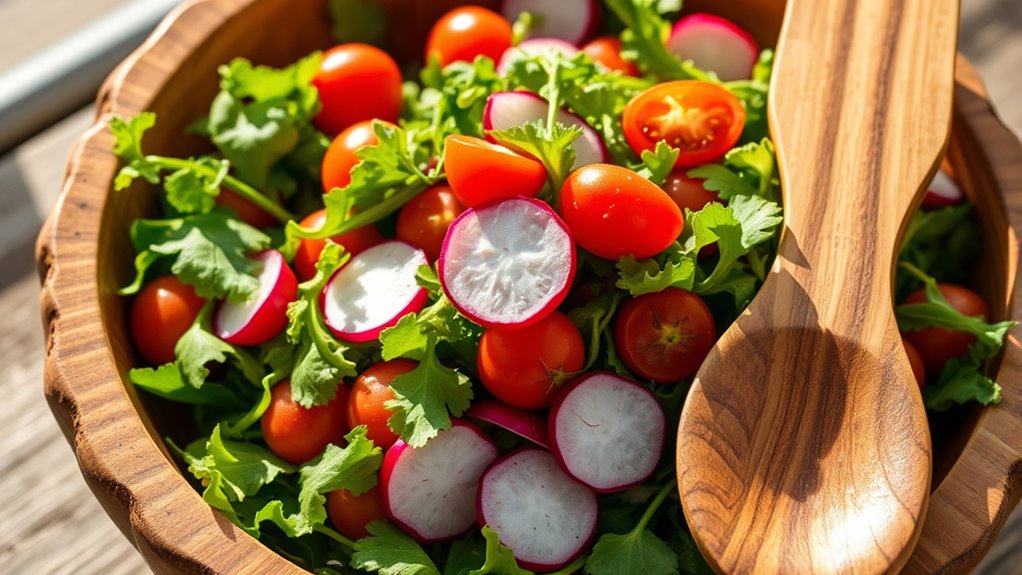
Choosing wooden salad servers is a smart way to support sustainability because they come from renewable, biodegradable trees like cherry, maple, and black walnut. Wooden utensils are an eco-friendly alternative to plastic, which can take hundreds of years to decompose and pollutes the environment. When sourced responsibly, wooden salad servers promote sustainability by using fast-growing trees that are replanted, ensuring a continuous renewable resource. By opting for wooden utensils, you reduce reliance on non-renewable plastics, helping lower your carbon footprint and support eco-conscious living. Plus, wooden salad servers are durable and long-lasting, encouraging reuse and reducing waste. Using sustainable harvesting practices can also inspire more environmentally conscious choices in your daily life. Additionally, incorporating wall organization systems with your kitchen decor can enhance functionality and reduce clutter, making eco-friendly living easier and more stylish. Embracing eco-conscious lifestyle choices further amplifies your positive impact on the environment. Overall, choosing wooden utensils not only benefits your health but also contributes positively to environmental preservation.
Craftsmanship and Design: Enhancing Functionality and Aesthetics
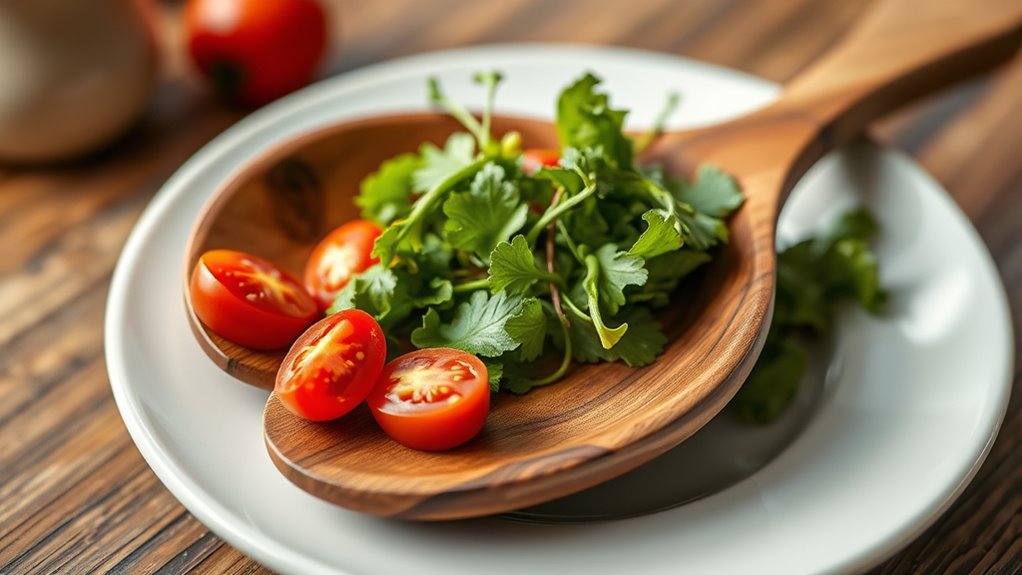
The artistry behind wooden salad servers elevates their functionality and visual appeal, making them more than just kitchen tools. Expert craftsmanship guarantees each pair features a subtle bend at the business end, designed over three years for ideal performance. The thick tip tapers back to balance ease of use with precision, helping you toss and serve salads effortlessly. Their long, slender shape keeps your hands away from the salad, reducing mess and improving control. Rounded edges and smooth surfaces are meticulously crafted to maximize comfort and safety during handling. The minimalist yet highly functional design combines aesthetic beauty with practicality, making these salad servers a stylish addition to your kitchen. Incorporating proper maintenance practices can help maintain the integrity of the wooden material and extend the lifespan of your salad servers. Regular cleaning and careful storage are essential components of effective wooden tool care, ensuring durability and ongoing visual appeal. Additionally, choosing high-quality wood enhances the durability and aesthetics of your utensils, contributing to their long-lasting appeal. This thoughtful craftsmanship enhances both how they look and how well they perform for everyday healthy eating.
Practical Benefits: Making Healthy Eating Easier and More Enjoyable
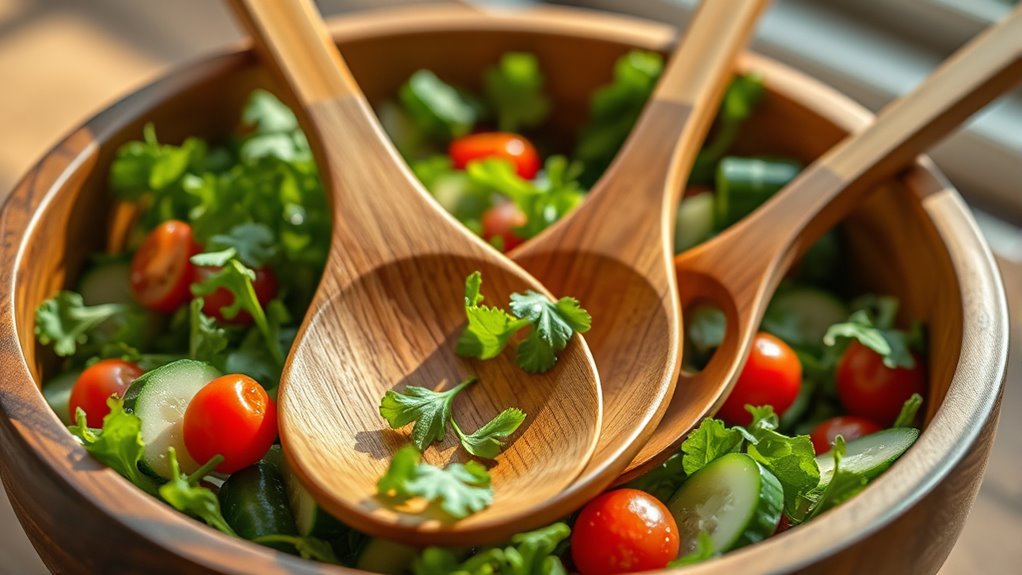
Using wooden salad servers makes healthy eating simpler and more enjoyable by designing tools that are easy to handle and clean. These salad utensils are ergonomically crafted to make tossing and serving salads effortless, encouraging you to prepare healthy meals more often. Their long, slender shape keeps your hands out of the salad, reducing mess and making the serving process cleaner. Made from durable, natural woods like cherry, maple, or black walnut, they also elevate your salad’s presentation, inspiring you to include fresh, wholesome ingredients. Additionally, wooden salad servers promote better hygiene because wood resists bacterial growth and is safer than plastic. Their aesthetic appeal and functional design turn healthy eating into a more inviting and satisfying experience, making your salads not just nutritious but also enjoyable to serve and eat. The natural properties of wood contribute to data privacy, ensuring safer contact with food and reducing chemical exposure. Using utensil materials that are safe and durable further enhances the overall experience. Moreover, choosing eco-friendly options aligns with sustainable indoor gardening practices, making your healthy lifestyle more holistic. Furthermore, incorporating skincare innovation principles in the design of kitchen tools highlights the importance of quality and safety in everyday items.
Selecting the Right Wooden Salad Servers for Your Kitchen
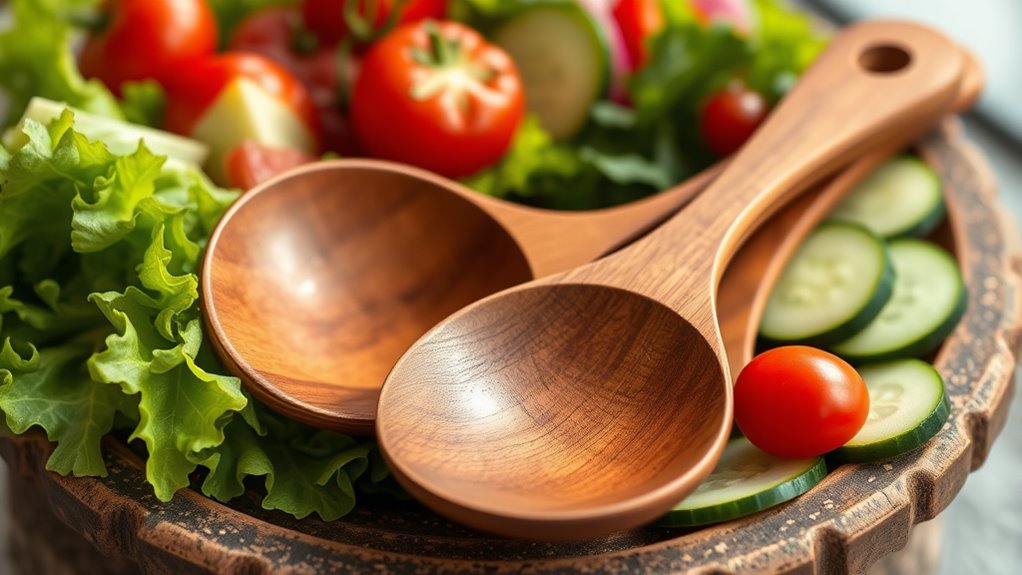
To guarantee you select the best wooden salad servers for your kitchen, focus on the quality of the wood and craftsmanship. Choose handcrafted wooden salad servers made from dense, slow-grown woods like cherry, maple, or black walnut for durability and safety. Ascertain they’re food safe by verifying they’re free from chemical stains, paints, or fillers. Look for smooth, rounded edges and ergonomic designs that make tossing and serving comfortable. Avoid servers made from low-density, fast-growing woods often processed with unsafe chemicals. Check the product source to confirm there are no artificial finishes, glues, or chemical bleaching. By paying attention to these details, you’ll select wooden salad servers that are safe, durable, and enjoyable to use in your healthy eating routine.
Caring for Wooden Utensils to Ensure Longevity and Safety
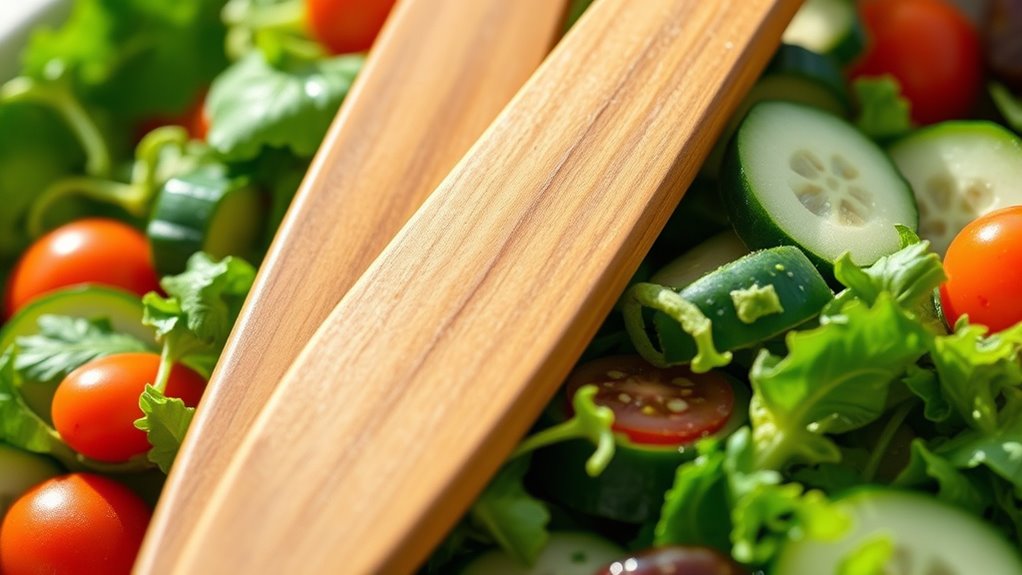
Proper care is essential to keep your wooden salad servers safe and lasting for years. To guarantee their longevity, hand wash wooden utensils with mild soap and warm water, avoiding dishwashers that can cause cracking and warping. Regularly oil the wood with food-safe oils like Bee’s Oil Wood Preserver to lock in moisture and prevent drying or splitting. Never soak wooden utensils in water for extended periods, as this weakens the wood and increases damage risk. Store your salad servers in a dry, well-ventilated area, or hang them through the small holes for air circulation and mold prevention. Periodically inspect for signs of wear or cracking, and sand rough edges smooth to maintain safety and extend your wooden utensils’ lifespan. Using UV filters can help protect the wood from sun damage if stored in areas exposed to sunlight. Additionally, avoiding exposure to excessive moisture helps preserve the durability of your wooden utensils over time. Incorporating proper storage and handling practices can also reduce the likelihood of payment data breaches indirectly by minimizing damage or contamination risks. Ensuring your wooden utensils are properly cleaned and maintained will help prevent bacteria buildup and keep them safe for food preparation. Being aware of the keto diet and its care requirements reinforces the importance of proper maintenance, ensuring your utensils remain safe for food preparation.
Frequently Asked Questions
Is Eating in a Wooden Bowl Healthy?
Eating in a wooden bowl is healthy because it’s made from natural, food-safe materials like cherry or maple. These bowls are free from harmful chemicals and resist bacteria growth when properly maintained. Unlike plastic, they don’t leach toxins or contain BPA. Just make sure you clean and oil your wooden bowl regularly, and you’ll enjoy safe, hygienic, and eco-friendly dining that enhances your healthy eating habits.
What Are the Pros and Cons of Wooden Bowls?
You want to know the pros and cons of wooden bowls. They’re durable, eco-friendly, and naturally beautiful, making them great for everyday use. However, you need to hand wash and oil them regularly to prevent warping and staining. Compared to plastic, they’re safer and less likely to harbor bacteria. While they’re long-lasting, improper care can reduce their lifespan, so you must maintain them properly for the best results.
Are Wooden Bowls Good for Salads?
Like a trusty shield, wooden bowls protect your salads with natural charm. You’ll find they’re perfect for serving, as they resist staining, odors, and bacteria, making them safe and durable. Their rustic beauty invites you to enjoy healthy, fresh meals more often. With easy hand washing and no harmful chemicals, wooden bowls support your wellness journey, turning everyday salads into a delightful, nourishing ritual you’ll look forward to.
Should You Oil Wooden Salad Bowls?
Yes, you should oil your wooden salad bowls. Oiling helps keep the wood moisturized, preventing cracks and splits over time. It creates a protective barrier that fights off moisture, mold, and bacteria, keeping your bowls safe and clean. Plus, regular oiling maintains their natural beauty and color. Just apply food-safe oils like beeswax or mineral oil every few months or after washing to keep your bowls in great shape.
Conclusion
Choosing wooden salad servers symbolizes your commitment to health and the planet. As you nurture your utensils, they become more than tools—they transform into a legacy of sustainable living. Every meal you prepare with them is a step toward harmony with nature, turning your kitchen into a sanctuary of mindful eating. Embrace these eco-friendly utensils, and let them remind you that small choices can shape a more vibrant, balanced world—one salad at a time.
